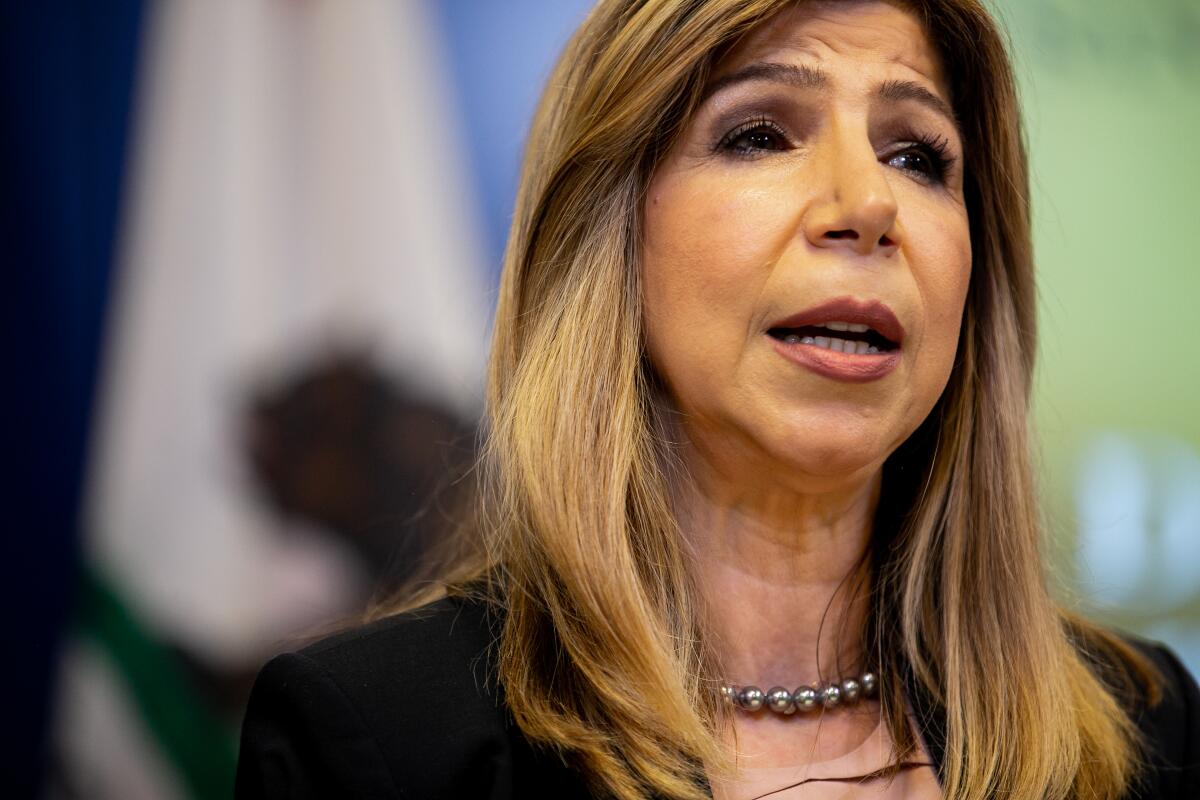San Diego County district attorney moves to lift all gang injunctions

- Share via
SAN DIEGO — In a move some view as a win for criminal justice reform, San Diego County Dist. Atty. Summer Stephan said this week that her office has filed petitions in court to lift all 20 injunctions against street gangs in cities throughout the county.
Seven of the 20 gang injunctions — court-approved orders that restrict the movements of alleged gang members — were dissolved as of Tuesday, with approval from judges in San Diego Superior Court.
For decades, police and prosecutors have used the injunctions to curb gang violence. But in some cases, the restrictions under the orders made it difficult for those who left that life behind to move on. Critics for years said injunctions, which stay in effect for a lifetime, impede the ability of people who put their gang days behind them to get jobs and housing. Some said the orders target communities of color.
“In listening to the communities we serve, I heard concern for the violence and harm that criminal organized gangs cause, but also that families are looking for more opportunities for healthy reentry for those who have turned their lives around,” Stephan said in a statement.
Geneviéve Jones-Wright, a member of San Diego’s Commission on Gang Prevention and Intervention, which recommended in 2019 that the city do away with injunctions, said community members put in the work to bring about the change.
“While the removal of gang injunctions from our local criminal justice system is a victory that should be celebrated, elected officials who have resisted this exact reform for over five years ... should not be erasing the work of community advocates and people of color and taking credit for reforms to score political points,” Jones-Wright said.
About 800 people whom law enforcement identified as documented gang members were subject to the injunctions over the years; the first in the county was issued in 1997. The 20 injunctions targeted 12 street gangs in six cities: San Diego, Escondido, Oceanside, Vista, San Marcos and National City. The orders ban individuals named in the injunctions from hanging out with other gang members, flashing gang signs or wearing clothes associated with gangs in designated areas.
In recent years, the district attorney’s office purged hundreds of names from the injunctions, including 332 names in 2019 and 77 as recently as December. The San Diego city attorney’s office removed 51 names from injunctions within city limits in 2019. Police, prosecutors and judges agreed those whose names were removed no longer posed a threat to the public.
In addition, there was a process for those named in the orders to petition the court to remove their names, but many were unaware of the process and others were unsuccessful.
With the dissolution of all injunctions, all remaining names — 349 — will be purged.
Stephan said her office worked with San Diego County Sheriff Bill Gore and police chiefs in the cities with injunctions in place to weigh the benefits and the “collateral consequences” of eliminating the injunctions. They determined the orders were “not effective in protecting the public from a primarily younger group of individuals who are committing gang-related crimes in our communities,” Stephan said.
She said Gore and the police chiefs supported the decision to lift the injunctions.
“This is a positive step to ensure all residents have the opportunity for a fresh start,” the Sheriff’s Department said in a statement.
Some police officials said injunctions are no longer a valuable tool to confront gang crime. In Escondido, Police Lt. Kevin Toth said most gang members listed in the city’s injunctions are in their late 20s or 30s and no longer active in gangs. He added that many are serving long sentences in prison.
“The rest have grown out of the gang life,” Toth said.
He said Escondido police officers “averaged one or two gang injunction arrests over the past couple of years.”
Oceanside police officers were in a similar situation: They made two injunction-related arrests in 2018, two in 2019 and one last year, according to a departmentwide memo Chief Fred Armijo issued Tuesday.
“We do not feel we can legitimately say that removing injunctions will lead to less safe neighborhoods even though this is one more tool that will no longer be available to us,” the chief wrote in the memo, according to a spokesman. “Although this action does remove one more tool that can have an impact on gang crime, it is my belief that there is more value to ending the injunctions as a means to improve trust within our community than keeping them in place.”
Stephan’s spokeswoman, Tanya Sierra, said the first petitions in court were filed March 25. In San Diego, court orders dissolved two injunctions two weeks later.
“Gang injunctions are outdated and do not serve their alleged purpose of protecting public safety,” said San Diego Mayor Todd Gloria, who supported an end to the city’s injunctions as part of a list of proposed police reforms he announced in April.
“It is the right thing to do and gives hundreds of San Diegans an opportunity to live without the fear a stale accusation could hurt their chances for good paying jobs, education and housing,” the mayor said.
Council Member Monica Montgomery Steppe, chair of the council’s public safety committee, said the injunctions unfairly targeted communities of color.
“Eliminating gang injunctions is a necessary step on the long road to reimagining public safety and equity in law enforcement,” she said. “There are no similar injunctions for white supremacists or hate groups. Therefore, we can clearly see how gang injunctions unfairly target, harm and potentially ruin the lives of innocent members of our Black and brown communities.”
She thanked Jones-Wright, chair of the Commission on Gang Prevention and Intervention, and other advocates who backed the change.
The commission formally called for an end to the injunctions in San Diego in September 2019, after years of research.
Hernandez writes for the San Diego Union-Tribune.
More to Read
Sign up for Essential California
The most important California stories and recommendations in your inbox every morning.
You may occasionally receive promotional content from the Los Angeles Times.










